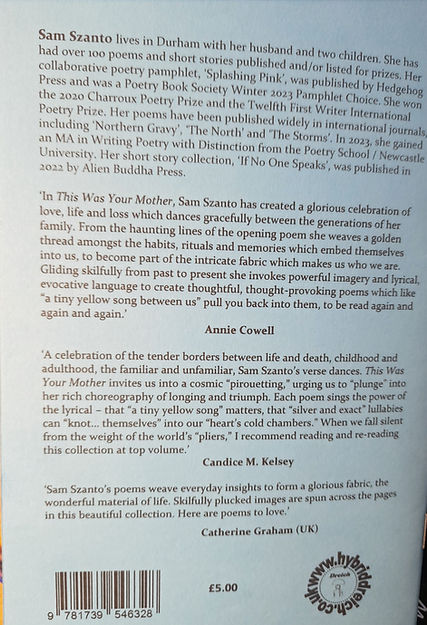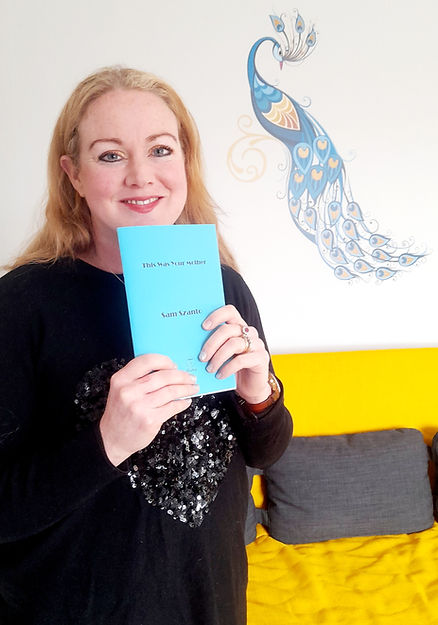20 Questions with... Jason Stocks
- samszanto2
- Jan 21, 2023
- 5 min read

Jason Stocks was born in Arkansas, raised in Mississippi, and currently calls Florida home. He received his BFA from Goddard College and his MFA from Pine Manor College where he was the 2014 Sharon Olds Poetry Fellow. His work has appeared in numerous journals including Exterminating Angel Press, Confrontation, Calliope, and Folly. His first full-length poetry collection Blameforest was released November 21, 2022, and his sophomore offering Laughing is Forever will be released in February 2023. Find him on Facebook at https://www.facebook.com/profile.php?id=100007481328530&sk=about
Please introduce yourself. Where are you from? What was your life like growing up?
Hello. My name is Jason Stocks. I’m from Mississippi, but have called Florida home for the last 15 years. My parents worked hard but could never get ahead. So I remember a lot of tough times coming up.
Did you always want to be a writer? If you also work, what do you do / did you do?
No, the first person I aspired to be was Michael Jackson. Thriller era. I was pretty good at basketball in high school and had dreams of playing in college and the pros. I started to write seriously when I was about 15, and have never stopped. Presently I teach creative writing and intensive reading at a charter school in south Florida. It’s the hardest job I’ve ever had, but also the most rewarding.
Tell us about your most recently published work in a sentence.
Blameforest—my first full-length poetry collection—is haunting, rhythmic, and vulgar.
What are you working on right now?
Right now I’m working on the final revisions for book 2: Laughing is Forever
Do you have a writing routine, and if so what is it?
Well, yes. I used to enjoy waking up early, maybe 4:30 or 5 AM, get my head right, drink some champagne, and start writing once the buzz kicked in. When I write I usually do so for 4-5 hours at a time. My writing comes from a place of pain, primarily, and the subjects I was writing about were difficult to broach sober. Or so I thought. But since we’ve had our son, and I’ve come to terms with how error-prone my writing is when drinking, I’ve cut it out (almost) altogether. Now I just have a coffee.
Where do you write – always in the same space, or different places? Can you write ‘on the move’?
I do some writing at home at my desk or downstairs at the kitchen table. But only if no one else is home. I need solitude. I used to write a lot in a nature preserve by my house called Apoxee. That’s why I called my first book Blameforest. It was my sanctuary. But that name had already been taken by Faulkner. I would walk miles through this lush, subtropical park and write on the back of envelopes, then put it in WORD when I got home. I was utterly alone, except for a few families of wild hogs, gators, snakes, and some birds of prey.
What advice do you have for other authors who are starting out? What is the best advice you’ve heard?
Don’t edit yourself at first, just get it all out. Read what you consider to be great literature and emulate those masters until you find your own voice. Pay close attention to punctuation in final drafts. Be ready for heavy rejection and spending time alone. The best advice I ever received was while I was working on my BFA at Goddard College with Poet Laureate Walter Butts. Because I was being all abstract and thought everything I wrote was great he put me in my place and said, “It’s not enough to just do something because you want to. You have to know the rules before you can break them.” That always stuck with me.
Do you enjoy doing live readings or are they a necessary evil – or somewhere in between?
I have only done 1 live reading. I would love to do more. Trying to book some now. I like hyping up a crowd.
Are there recurring themes in your work? Where do you feel these emanate from if so?
Yes, there are recurring themes in my work, such as my hip-hop influences, domestic violence, poverty, dreaming big, Sumerian mythology, and an undying love for the American South. I lived it all, long before it was committed to paper, so these themes are plucked directly from real-life events.
Should writers have a moral purpose? What is the purpose of a writer in today’s society?
Moral purpose is relative these days. I think writers should write about things they’re concerned about, things they know about, so that they can write with a sense of … authority. Maybe some are out there trying to save the world but my concerns are more regional. I think humanity is stuck in its ways and will never change. In fact I believe things are about to get much worse. I speak out against it, when I’m compelled to, but we may have passed the point of no return. So I write to have fun, to shed skin, and to inspire others to at least follow their dreams. But I don’t expect the rest of the world to jump on the bandwagon with me.
Do you write between genres or not?
I write poetry and flash fiction. My novel Sing Like a Bomb will be released in late 2023.
Which living writers do you most admire?
I enjoy Brad Watson, Tim Dorsey, Donna Tart, and Jacob Appel.
Which dead writers do you most admire?
My favourite dead writers are John Fante, William Faulkner, Barry Hannah, Flannery O’Conner, Dalton Trumbo, and WS Merwin.
What’s the book you wish you’d written?
I wish I’d written 1933 Was a Bad Year by John Fante.
What other external influences do you have: nature/place, music etc.?
I’m heavily inspired by music, the natural world (hurricanes, tornadoes, floods), crime stories I read in the news, and stories from the old folks back in Mississippi.
Do you suffer from ‘writer’s block’ and how do you overcome it if so?
When I have writer’s block it just means I shouldn’t be writing. I don’t force it anymore.
What’s been your favourite reaction to your writing?
I had a trans student from Bangladesh recently tell me that studying under me, and reading my book while being able to talk to me about it, about the process, etc., has inspired her, and given her confidence, to write about, to write out her trauma. That made me want to keep fighting the good fight.
How do your family and friends feel about your writing?
My wife understands ‘cause she went through it all with me. When I was broke and depressed and couldn’t keep a job I kept promising her that one day I’d write a book and that she’d see that it wasn’t all for nothing. When she held the book in her hand for the first time, she knew. No one else understands.
Do you have a favourite bookshop?
My favourite book store is Lemuria Book Store in Jackson, Mississippi.
How do you see the future of writing? Will we become more or less dependent on Amazon?
The Sumerians said, thousands of years ago, that nothing under the sun is new. That’s largely true because there can only be so many plots, so many characters, so many beginnings and endings. And only so many ways to say it. But as we advance scientifically, technologically, and as we begin to traverse the cosmos we will have so much more to add to the incredible body of literature that we already have. The hard copy book, I mean the good old-fashioned, hold-in-hand paperback will never go out of style. They will always sell, and I think books are seeing a rise in sales currently. Since COVID maybe. But Amazon certainly has its place cemented in the future of the industry because of their buying power, their selection, and the convenience of shopping at home for books, being able to read samples, and … you can return them. Kindles and things of that nature have probably reached their epoch. One day the lights will go out, and we will be back reading by candlelight.










Comments